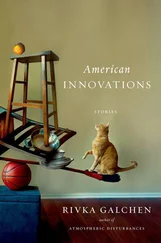In retrospect, I can’t help but wonder if maybe she was avoiding someone, what with all the nervousness and mind changing.
We went there, to Koronet, where I’d originally proposed. But for having fallen out of the plan and then back in, it seemed like a place anew, and if my spirits had been lagging earlier, inevitably disappointed in this woman for agreeing to spend time with me, I now was infatuated with her again, through my standard mathematics of love, a sort of dynamic stability, with Rema being now a new Rema, an always and ever renewable Rema, whose parts never quite added up. What can I say — why should I expect my inner workings to be different from anyone else’s?
Rema ordered a slice of cheese, and took a plastic fork and knife, and I watched her slicing her pizza. I then took a fork and knife to my own pizza. I sliced the whole thing to pieces before taking a bite. Rema and I sat along the counter where there is a mirror, and I stole glimpses of us, of our reflection, where we looked like a happy blushing pair, and I had a little moment of imagining being over there on that side of the mirror, the side where we were happy and new and now forever.
We had such nice early days. Everyone looked at Rema, but Rema always complimented me and seemed to notice other men only so as to point out how they paled in comparison to me, how one might be handsome but not clever enough, another clever but not boyish enough, another boyish but without depth. She made me small gifts — elaborate origami boxes, uselessly small pillows, socks with my initials embroidered on them — always getting these gifts to me in a hurry, as if there weren’t time enough to finish them, as if our relationship were always on the cusp of ending suddenly, unforeseeably, as if by natural disaster.
How odd, now that I think about it, that she loved me.
15. An object that will not be permanent
I turned my back on the corduroy-petting simulacrum — waiting there for the whole truth as she was — and I answered the ringing phone.
The other line hung up.
How random.
Although a series of hang-ups, I suppose that’s not so random.
“Who was it?” she said.
“Who do you think it was?” I said.
Maybe she was waiting for a call from Anatole. Or the night nurse. Or the Royal Academy of Meteorology.
“The whole truth,” she said with disgust, getting up to turn on the television. She quite obviously didn’t really think that I would leave, didn’t really believe that I was on to her.
And I admit that I didn’t entirely believe myself either. If I’d looked up at the ceiling and saw in the drips there an arrow pointing me out the door — well, then I would think I was imposing a self-deluding order onto chaos. If I’d seen three fallen buttons on the floor and perceived them as a triangle pointing me in a particular direction — again I wouldn’t have trusted my perceptions. If I heard voices. If I had a fever. Or any neurological signs. Or feelings of grandeur. Or if all the articles in the newspaper seemed to bear messages especially for me. Even just if the weather had been on when the simulacrum turned on the TV, and if I took that fact too seriously — even then, I would have doubted myself, wondered about the selectiveness of what I noticed. But none of that was happening.
“You’re like a different person these past couple of days,” she said. “Maybe months.” And there couldn’t have been a more bold, if tacit, acknowledgment of the situation than that. A fresh vision crept over me: myself at an airport desk, in much better shape and younger than I actually am, casually asking to be put on “the next flight to Buenos Aires.” Hurried keyboard tapping, a negotiatory phone call, an underling being sent ahead to the gate to ask them to please hold the door! A seed of happiness in me: at the thought of being a player in some tragedy or comedy so much larger than myself. Surely I was emotionally suffering terribly, but of course our minds play tricks, dress up our emotions in masks, hosiery, feathers. That can be very useful. It was good to feel kind of good.
I waited for the woman to fall asleep, so that I could leave in peace. I packed a suitcase quietly, filled it with my clothing, and a bit of Rema’s clothing as well, so that I’d have it to bring to her. I kissed the dog goodbye. At the airport I called my mentor, who had been through town and who had reacted to Rema so strangely. I mean sort of strangely. I tried to ask him about his reaction to her, if he thought something was “off” with her; I tried to ask him somewhat discreetly. But this is what he said to me: “You used to just be jealous. Now you’ve converted your jealousy into a psychological gain, some narcissistic pleasure in believing that everyone else wants what you have, wants to sleep with your wife. You should grow up. It’s not healthy.”
His response was neither random nor spontaneous; it was predetermined by his previous ideas about me; habits of thought are death to truth; I was outside of my habits; and he — he was wrong.
16. I contact a third party
Although the elaborate latticing of the ceiling had given me a kind of confidence in the country’s infrastructure, still my suitcase (Rema’s suitcase) did not arrive on the carousel at the airport in Buenos Aires. An attendant — a thin man with pockmarked skin and longish hair and a Roman nose and a filmy oxford shirt through which I could see his undershirt — told me not to wait but to return the next morning, that nothing could be settled until then.
“I have important things inside,” I said in my poorly accented Spanish. Maybe it sounded like I was talking about my feelings. That first burst of language made me feel like a child, unable to find more precise, or more polite, words.
“I understand,” the attendant politely lied in response.
“Shouldn’t an investigation be started?” I asked.
He reiterated that I should return the next day. “You are not having an unusual experience,” he emphasized, then looked past my shoulder to the woman behind me.
So luggageless, I set out into the city. I began my search for Rema by settling on the most direct and reasonable of plans: calling her mother. A more bold notion than it might appear. Not only had I never met Rema’s mother, Magda, but she didn’t even know — as far as I knew — that Rema was married to me. She didn’t even know I existed at all. Rema was estranged from her mother, or her mother from her, or both. I didn’t really know the whole story, not even the whole Rema version of the story. (And about Rema’s unmentioned father — I never even asked. I presumed one of several sad variations. I’m not the only psychiatrist who advocates occasionally leaving silences silent, not confounding confession with intimacy.)
I found a public telephone, a glass and red-painted metal takeoff of a London phone booth. Stepping inside — why did Argentina look so wrong? where were all the beautiful people? why did the architecture look like it belonged in Tel Aviv? — I flipped through the phone book and found her number — so easy! Then I breathed on the glass, then smudged my breath, then breathed again, smudged again, such that I was looking at a saliva-rainbowed distorted reflection, which at least gave me something to look at while I held that phone inevitably infested with the invisible germs of a thousand strangers.
A woman answered, and I introduced myself as “a friend of Rema.”
On the other end: “What?”
I cut to the proverbial chase — very proverbial, I was feeling — with, “Listen, if you don’t mind my asking, when was the last time you saw Rema?”
She asked, “With whom am I speaking?”
Читать дальше
Конец ознакомительного отрывка
Купить книгу












